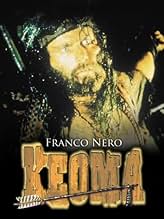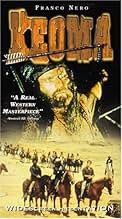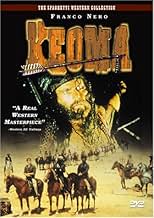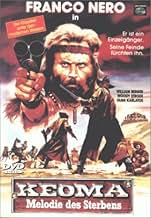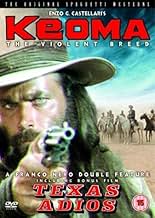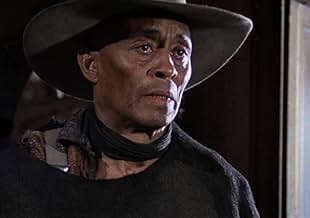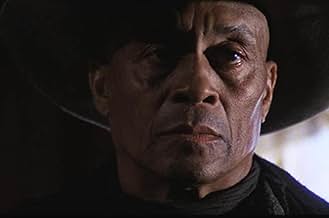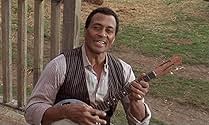ÉVALUATION IMDb
7,0/10
6,6 k
MA NOTE
Ajouter une intrigue dans votre langueAn ex-Union gunfighter attempts to protect his plague-ridden hometown from being overridden by his racist half-brothers and a Confederate tyrant.An ex-Union gunfighter attempts to protect his plague-ridden hometown from being overridden by his racist half-brothers and a Confederate tyrant.An ex-Union gunfighter attempts to protect his plague-ridden hometown from being overridden by his racist half-brothers and a Confederate tyrant.
Joshua Sinclair
- Sam Shannon
- (as John Loffredo)
Donald O'Brien
- Caldwell
- (as Donald O'Brian)
Leonardo Scavino
- Doctor
- (as Leon Lenoir)
Antonio Basile
- Caldwell's Henchman
- (uncredited)
Giovanni Bonadonna
- Caldwell's Henchman
- (uncredited)
Armando Bottin
- Caldwell's Henchman
- (uncredited)
Aldo Canti
- Wagon Fugitive
- (uncredited)
- …
Felice Ceciarelli
- Caldwell's Henchman
- (uncredited)
Avis en vedette
After the American Civil War, the half-breed Keoma (Franco Nero) returns to his homeland and rescues a beautiful pregnant woman accused of having plague, Lisa (Olga Karlatos), from a gang leaded by the landlord Caldwell (Donald O'Brian). Later he meets his former slave servant and friend George (Woody Strode), now a drunk free man, and his father, William Shannon (William Berger), and he is informed that the town is under siege of Caldwell's men, without supplies of medicine or food and justice, with the dweller dying of plague and starvation and sick people is being isolated in an old mine. Further, his three dangerous half-brothers have joined Caldwell's force. Keoma decides to help Lisa and the dwellers to retrieve their freedom and dignity, and he finds how despicable the inhabitants are.
The unknown western "Keoma" was a great surprise for me. Although predictable, the story is great, disclosing the relationship of Keoma with his brothers and father through his recollections from his childhood, and does not have a happy commercial end. Franco Nero is amazing in the role of a lonely half-Indian with a great sense of justice and freedom, love and loyalty to his father and regret and resentment to his half-brothers. The direction and cinematography are excellent, with a fantastic choreography of the fights, set decoration and costumes: in the dusty, windy and dirty city, the men's clothes (and themselves) are very dirty, and not like in most of Hollywood movies, where the cowboys wear very clean clothes. There is a particular scene that I believe is unique in the cinema, when Keoma promises four bullets for four hit men, and while bending his four fingers, we see each of his targets. The annoying soundtrack, although having the good intention of creating a narrative of the feelings of the characters, is the only negative aspect in this movie. My vote is seven.
Title (Brazil): "Keoma"
The unknown western "Keoma" was a great surprise for me. Although predictable, the story is great, disclosing the relationship of Keoma with his brothers and father through his recollections from his childhood, and does not have a happy commercial end. Franco Nero is amazing in the role of a lonely half-Indian with a great sense of justice and freedom, love and loyalty to his father and regret and resentment to his half-brothers. The direction and cinematography are excellent, with a fantastic choreography of the fights, set decoration and costumes: in the dusty, windy and dirty city, the men's clothes (and themselves) are very dirty, and not like in most of Hollywood movies, where the cowboys wear very clean clothes. There is a particular scene that I believe is unique in the cinema, when Keoma promises four bullets for four hit men, and while bending his four fingers, we see each of his targets. The annoying soundtrack, although having the good intention of creating a narrative of the feelings of the characters, is the only negative aspect in this movie. My vote is seven.
Title (Brazil): "Keoma"
Though to be clear I wouldn't go as far as to call it "the best". Something the people involved are quick to point out or to. This is really good and you have a very charismatic (and hairy chested) Franco Nero starring. You also have supernatural elements, that may not be fully explained (not even by all the extras on the disc).
And you have old school shooutous, where bad guys seem to only need one bullet to bite the dust (literally), whereas good people have to be shot quite a few times mostly. So yes there are things that may seem or feel dated, but the overall sense is quite great. Not to mention the performances. Really telling and really inspired overall.
And you have old school shooutous, where bad guys seem to only need one bullet to bite the dust (literally), whereas good people have to be shot quite a few times mostly. So yes there are things that may seem or feel dated, but the overall sense is quite great. Not to mention the performances. Really telling and really inspired overall.
Talk to most Spaghetti Western fans and they will declare Keoma to be one of the finest of the genre's movies, and probably the best of the latter day ones. However they will also most probably comment on the atrocious soundtrack, which does take some getting used to. I honestly believe that if this movie had been given the Morricone touch, it would be firmly cemented as a true Spaghetti classic, standing side by side with The Big Gundown, Face to Face and Bullet for the General.
Aside from Django, this is Franco Nero's best role. A half breed venger, riding into a town decimated by both the plague and a gang of racist ex-Confederates, which includes his three hateful "brothers" in their ranks. There are also fine turns by William Berger as Keoma's adopted father Shannon, and Woody Strode as Keoma's childhood hero turned drunk, George.
As always, Castellari has injected true class into this film, with slow motion shootouts, effective flashbacks and clever camera tricks. This film is a true fitting end to the Spaghetti hay day, which had begun to loose its charm due to the ever increasing stupidity of the comedy westerns. The only negative aspect is that wretched soundtrack. Oh where was Morricone when we really needed him?
Aside from Django, this is Franco Nero's best role. A half breed venger, riding into a town decimated by both the plague and a gang of racist ex-Confederates, which includes his three hateful "brothers" in their ranks. There are also fine turns by William Berger as Keoma's adopted father Shannon, and Woody Strode as Keoma's childhood hero turned drunk, George.
As always, Castellari has injected true class into this film, with slow motion shootouts, effective flashbacks and clever camera tricks. This film is a true fitting end to the Spaghetti hay day, which had begun to loose its charm due to the ever increasing stupidity of the comedy westerns. The only negative aspect is that wretched soundtrack. Oh where was Morricone when we really needed him?
This film has so much that works so well, it's a shame one thing keeps it from working entirely l: the music. The single most annoying song I've ever heard in a film. Secondly the newest "restored" version inexplicably has two totally different English voices dubbed for Nero. His first few lines are delivered in a deep clear "radio announcer" pure English baritone, the rest of the film is in a poorly faked accent. What exactly would be the reason for this? Other than those two distractions, a great late era entry to the genre.
A half-breed Indian Keoma returns back to his hometown after fighting in the Civil War, and finds his town is being run by an ex-Confederate soldier Caldwell and his outlaws. He holds power over the town by letting the plague infect the inhabitants, and since he won't let any sort of treatment be transported in. He sets up a community for those infected, and this where Keoma rescues a pregnant woman on her way there and returns her back to town. His three half-brothers have joined Caldwell, and I don't think that highly of their brother's return. But loyalty to their father, they won't kill him. His father William Shannon and former family servant/only friend George eventually join Keoma to break the strangle hold Caldwell possess.
Whoa! How good? Real good. Director Enzo G. Castellari's grand looking and interesting spaghetti western comes across as a powerful and beautifully constructed Greek tragedy with a cynical and almost psychological edge bound to it. There's a bit everything chucked into this passionate and intelligent exercise. Breathing high on mood and atmosphere, photographer Aiace Parolin exquisitely frames the mercilessly brooding locations and Castellari's stylishly first-rate direction keeps the film sombre with a brutally unsparing and dirt-laced tone in its dramatic images and context. Good use of abstract lighting and composition, he knows how to keep the viewer at bay with slam-bang set pieces towards the end and a downbeat undercurrent. Inventive framing and exposition also shows the quality of his direction. The glorious slow-motion shootouts and editing technique (ala Sam Peckinpah) are dazzling and how about the constant jumping or leaping in the air. Was there a hidden trampoline on set?! Everything about it held a nice rhythm to it and you just get swept along. Even the flashback sequences are positioned in the story accordingly and in a fulfilling style. The lyrical story is full of symbolic and thematic issues (freedom being the main focal point) that do pack a punch, but also showing a vulnerable side. This gave it a real singular vibe to set it apart from the crowd. Hell, I didn't mind the uncanny and soaring ballad soundtrack too. The way it actually interlocked with the film's sequences, I thought it gave the film some soul and a backbone (well other than always charismatically reliable Nero). A rugged Franco Nero was outstanding. Both mentally and psychically in his scrappy determination and seldom figure Keoma. The impressively committed Woody Strode was excellent. William Berger brought class, and Olga Karlatos decently balanced out an innocent side that really was moving. Donald O'Brien nails it down in a starch turn as the villainous Caldwell.
Whoa! How good? Real good. Director Enzo G. Castellari's grand looking and interesting spaghetti western comes across as a powerful and beautifully constructed Greek tragedy with a cynical and almost psychological edge bound to it. There's a bit everything chucked into this passionate and intelligent exercise. Breathing high on mood and atmosphere, photographer Aiace Parolin exquisitely frames the mercilessly brooding locations and Castellari's stylishly first-rate direction keeps the film sombre with a brutally unsparing and dirt-laced tone in its dramatic images and context. Good use of abstract lighting and composition, he knows how to keep the viewer at bay with slam-bang set pieces towards the end and a downbeat undercurrent. Inventive framing and exposition also shows the quality of his direction. The glorious slow-motion shootouts and editing technique (ala Sam Peckinpah) are dazzling and how about the constant jumping or leaping in the air. Was there a hidden trampoline on set?! Everything about it held a nice rhythm to it and you just get swept along. Even the flashback sequences are positioned in the story accordingly and in a fulfilling style. The lyrical story is full of symbolic and thematic issues (freedom being the main focal point) that do pack a punch, but also showing a vulnerable side. This gave it a real singular vibe to set it apart from the crowd. Hell, I didn't mind the uncanny and soaring ballad soundtrack too. The way it actually interlocked with the film's sequences, I thought it gave the film some soul and a backbone (well other than always charismatically reliable Nero). A rugged Franco Nero was outstanding. Both mentally and psychically in his scrappy determination and seldom figure Keoma. The impressively committed Woody Strode was excellent. William Berger brought class, and Olga Karlatos decently balanced out an innocent side that really was moving. Donald O'Brien nails it down in a starch turn as the villainous Caldwell.
Le saviez-vous
- AnecdotesThe story line of the film was mostly improvised at the same time as the film was made. The original story treatment was written by Luigi Montefiori (aka George Eastman) and turned into a script by Mino Roli and Nico Ducci, but director Enzo G. Castellari didn't like what had been written by the latter two. Because of problems with the schedule, Castellari and actor Joshua Sinclair wrote the script for the next day every evening after filming of the day. Castellari was also open to suggestions from the cast and crew - Franco Nero has confirmed that he wrote some of his own dialogue.
- GaffesAt 7:08 riders on horseback in pursuit of two men running on foot fire their pistols. Both men on foot react as if hit by the first shot.
- Autres versionsGerman version was cut for violence and pacing reasons by 8 minutes to secure a "not under 16" rating. Despite that, it still got put on the index list by the BPjM which means various sales and advertising restrictions. Fortunately in 2003, the movie was removed from the index list and the FSK granted the uncut version a "not under 16" rating.
- ConnexionsFeatured in L'Oeil du cyclone: Westernissimo (1995)
- Bandes originalesKeoma
(uncredited)
Music by Guido De Angelis & Maurizio De Angelis
Lyrics by Susan Duncan Smith and Cesare De Natale
Performed by Sibyl Mostert and Cesare De Natale
Meilleurs choix
Connectez-vous pour évaluer et surveiller les recommandations personnalisées
- How long is Keoma?Propulsé par Alexa
Détails
Contribuer à cette page
Suggérer une modification ou ajouter du contenu manquant



